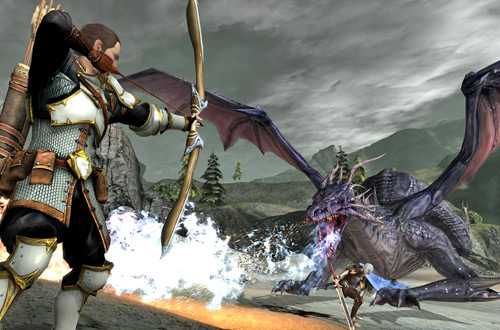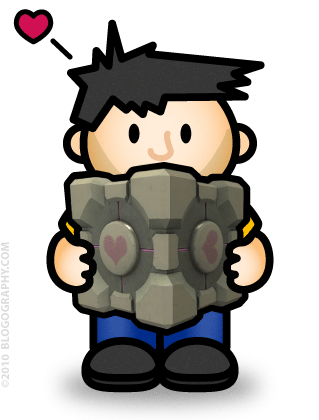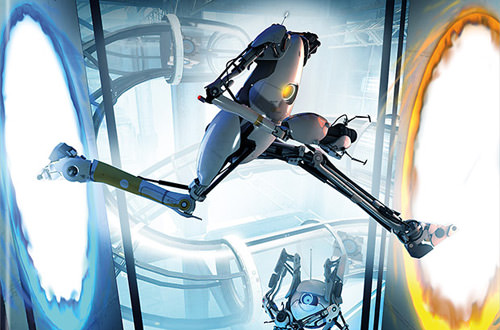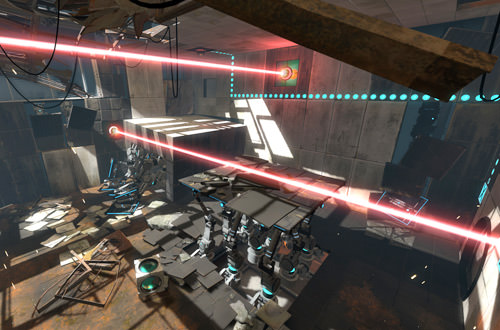
 There's never enough time to do all the stuff I want to do.
There's never enough time to do all the stuff I want to do.
I've got a pile of DVDs that go unwatched because I don't have the time. I've got stacks of comics which sit unread because I don't have the time. I've got a shelf full of books which are gathering dust because I don't have the time. My DVR is full to bursting with television shows because I don't have the time. And so on. And so on.
But the worst offense of all is the eight video games that sit shrink-wraped and unplayed because I don't have the time. And now I'm told that my copy of the awesomeness that is Dragon Age 2 is arriving. This wouldn't be so bad, except it's going to be really hard to toss it on the pile when A) I loved the previous game, Dragon Age: Origins, and B) It looks incredible...

But, alas, I don't have the time.
And it gets worse.
One of the greatest games ever made is Portal. I love that game so much that I would marry my in-game Weighted Companion Cube tomorrow if it were legal to do so...

And in April, Valve is releasing the most eagerly anticipated game ever... Portal 2! As awesome as the first game was, the sequel looks to be taking things to an entirely new level. There's all kinds of new challenges to be found, and the game looks amazing...


How can I not play that?
I wonder if I can get a note from my doctor to get out of work on April 19th? Because, obviously, not playing
I wish I had time to go to the doctor.
 Roger Ebert, one of the very few movie critics I respect, a writer I admire, and one of the most fascinating people on the planet, recently wrote a column on his blog stating Video Games Can Never Be Art. Since I've made artistic contributions to a couple of video games, I was tempted to dismiss the article outright. But it's Ebert, so I am compelled to consider his premise. Then Livvy Collette wrote a nice rebuttal that touched on why I can't agree with Ebert's conclusion: there's such a huge amount of creativity involved in crafting a good video game that they can't help but be art.
Roger Ebert, one of the very few movie critics I respect, a writer I admire, and one of the most fascinating people on the planet, recently wrote a column on his blog stating Video Games Can Never Be Art. Since I've made artistic contributions to a couple of video games, I was tempted to dismiss the article outright. But it's Ebert, so I am compelled to consider his premise. Then Livvy Collette wrote a nice rebuttal that touched on why I can't agree with Ebert's conclusion: there's such a huge amount of creativity involved in crafting a good video game that they can't help but be art.
Which brings us to this immutable fact:
I love my Weighted Companion Cube from the video game Portal more than most people I meet.

Sure it's wacky, improbable, and borderline psychotic... but it's also inexplicably true.
Because not only is my Weighted Companion Cube just a "character" from a video game... it's also an inanimate object from a video game. Yet, the artists at Valve have created a fully realized environment so involving that it causes an emotional response from me towards it. And while I'll be the first to admit that this feeling is not as powerful as the one I get from looking at a painting like Starry Night or watching a film like Cinema Paradiso or reading a book like Jonathan Livingston Seagull or standing in a structure like St. Peter's Basilica... it's still the kind of reaction I get when exposed to a work of all-encompassing art.
Portal is also a lot of fun, which is just a bonus.
The thing that makes art so fascinating is that it is ever-changing and cannot be easily defined. Many of the things we know as "art" today would have been inconceivable a century ago. Or, if not inconceivable, certainly not defined as "art." I once went to a gallery installation where a room was fitted with video screens on the walls and electronic sensors in the floor. The sensors calculated the combined weight of all the people standing in the room, ran the data through a mathematical formula, then displayed beautiful graphics on the wall accordingly. If there were few people in the room, the graphics would be serene. As more people entered, the displays became more chaotic. I accepted the room as artistic expression, even though I had reservations as to the premise (the number of people is easily skewed... twenty small children register as fewer people, three NFL linebackers register as more). Everything in the room was created (albeit dynamically) to affect the senses, perhaps even provoke a reaction. Just like a video game.
Just like art.
And if technology keeps progressing, eventually virtual reality will involve people within the simulation creating art that only exists inside a computer. Thus making a video game out of life. The ultimate artistic expression.
In the end, no one person can define what is... or is not... art. That's because art is subjective and not quantifiable. Art is something you feel. Art is something you sense. Art is something you believe.
Art is in the eye of the beholder.
And lest you think that my opinion is flawed because of my admitted video game psychosis, I would be remiss not to disclose that my Weighted Companion Cube agrees with me completely.
